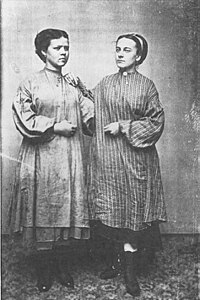Lowell Mill Girls

The Lowell mill girls were a group of women who worked in factories in Lowell, Massachusetts during the 19th century. These factories made textiles, or fabric and clothing, and the women, who were mostly unmarried and without many other job options at the time, were hired to work there.
The Lowell mills were different from other factories because they were designed to be clean, safe, and comfortable places to work. The mill owners built boarding houses for the workers to live in, and provided them with food, healthcare, and education. This was because the mill owners wanted to attract young, educated women to work in the mills, and they believed that by offering these benefits they could do so.
The women who worked in the mills were called "mill girls". They worked long hours, typically from dawn until dusk, six days a week. They operated machines and did other tasks that were repetitive and tiring. However, they were paid a small amount of money and this allowed them to support themselves and their families.
At the time, the mill girls were seen as an example of the possibilities of women's employment. They were also part of a movement to improve the rights and conditions of workers in general. However, the mills eventually declined and many of the mill girls had to move on to other jobs or to new locations.
Overall, the Lowell mill girls were an important part of American history because they symbolized the changing role of women in society, and the struggles and triumphs of workers in the face of industrialization.
The Lowell mills were different from other factories because they were designed to be clean, safe, and comfortable places to work. The mill owners built boarding houses for the workers to live in, and provided them with food, healthcare, and education. This was because the mill owners wanted to attract young, educated women to work in the mills, and they believed that by offering these benefits they could do so.
The women who worked in the mills were called "mill girls". They worked long hours, typically from dawn until dusk, six days a week. They operated machines and did other tasks that were repetitive and tiring. However, they were paid a small amount of money and this allowed them to support themselves and their families.
At the time, the mill girls were seen as an example of the possibilities of women's employment. They were also part of a movement to improve the rights and conditions of workers in general. However, the mills eventually declined and many of the mill girls had to move on to other jobs or to new locations.
Overall, the Lowell mill girls were an important part of American history because they symbolized the changing role of women in society, and the struggles and triumphs of workers in the face of industrialization.
Related topics others have asked about:
